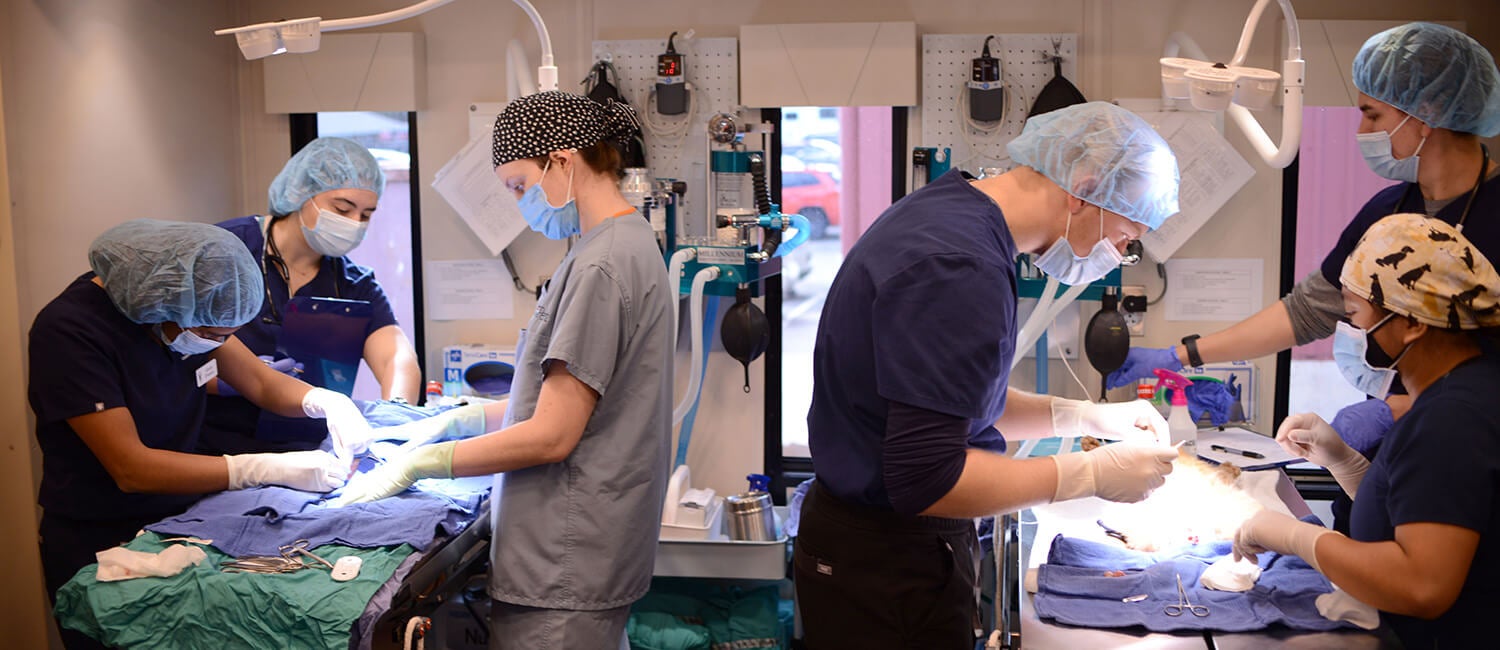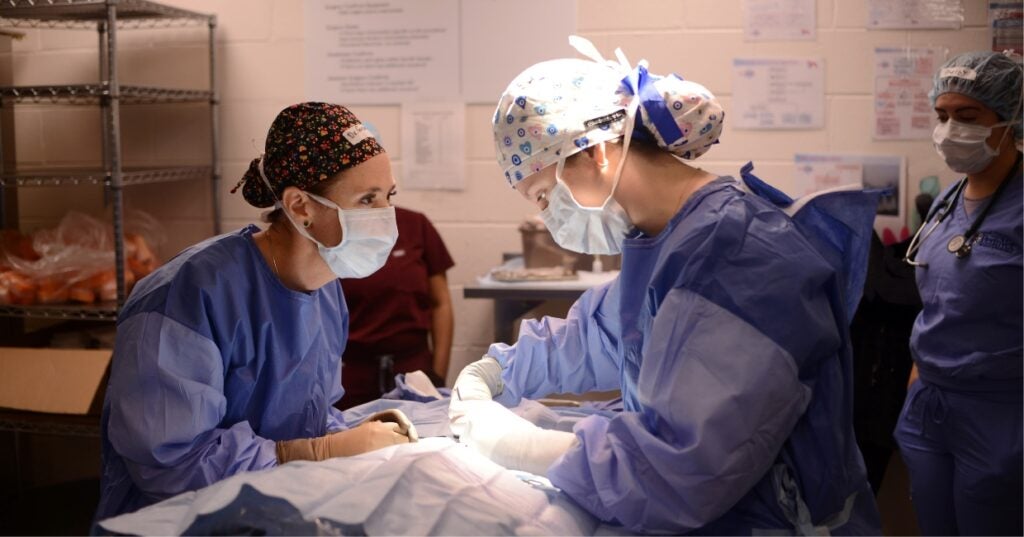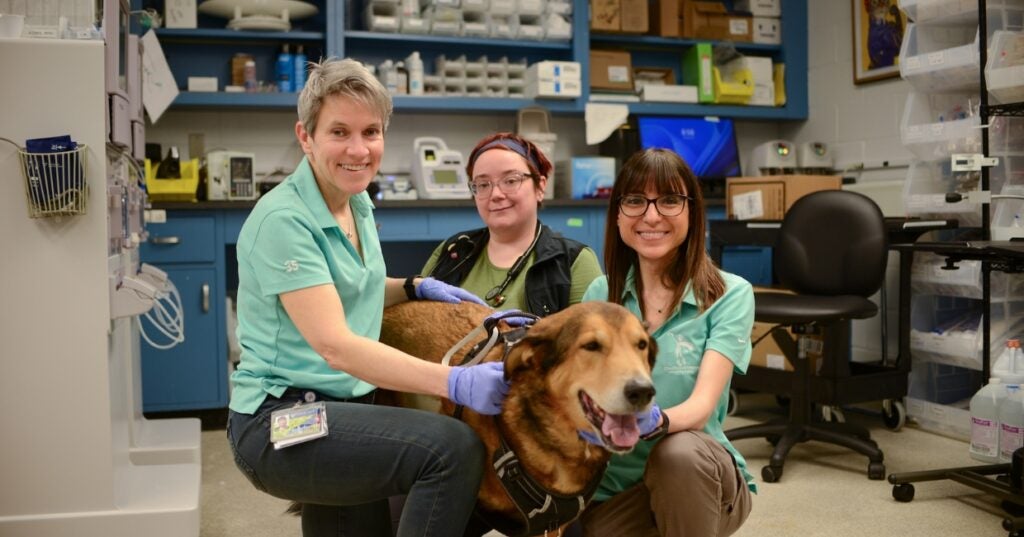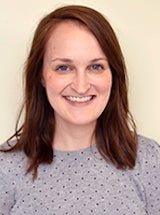The Harold and Judy McKonly Family Foundation Donates $3.4 Million to Penn Vet to Support Shelter Medicine Program

Faculty In This Story
Thanks to a generous $3.4 million gift from The Harold and Judy McKonly Family Foundation, the University of Pennsylvania’s School of Veterinary Medicine (Penn Vet) will continue its pioneering work within the field of animal shelter medicine and community outreach. This gift provides endowed support for veterinary student training through mobile unit clinical and surgical services with both shelters and the public. It also creates centralized funding for educational programming and outreach to underserved communities.
The American Society for the Prevention of Cruelty to Animals (ASPCA) reports that approximately 6.3 million companion animals enter animal shelters across the United States each year. Pennsylvania’s shelter organizations, according to the national database Shelter Animals Count, admitted nearly 69,000 homeless animals in 2020, placing Pennsylvania in the top-third countrywide for animal intake. Philadelphia and the surrounding counties of Bucks, Chester, Delaware, and Montgomery, accounted for 52% of that state-wide intake. Veterinary leadership in population health, shelter intake diversion, and community support services is critical for ethical and effective public health interventions.
“This gift will have a lasting impression on our next generation of shelter veterinarians enabling them to protect and care for some of our most at-risk animals here in Pennsylvania and across the country,” said Andrew M. Hoffman, DVM, DVSc, DACVIM, Gilbert S. Kahn Dean of Veterinary Medicine. “I’m so very grateful for the McKonly family’s generosity as it will have an enduring impact on the University of Pennsylvania’s School of Veterinary Medicine and on those who attend it.”
Penn Vet’s Shelter Medicine Program has nine different community partners and during the last five years, completed more than 17,500 surgeries and 2,200 exams – accounting for approximately 40,000 hours of community service across the greater Philadelphia area. The Penn Vet Shelter Medicine Program is the first academic shelter medicine program to integrate humane and STEM educational outreach in their core programming. The program has reached over 800 high school and middle school students. The Shelter Medicine team has published 18 peer review publications relating to education, shelter medicine, public health, animal welfare, and community engagement. Penn Vet’s 40-foot mobile veterinary hospital, funded in part by the Bernice Barbour Foundation and PetSmart Charities, has enabled the Shelter Medicine Program to provide services and high quality training in the community.

“On behalf of the University of Pennsylvania School of Veterinary Medicine’s Shelter Medicine Program, I would like to extend our sincere gratitude to the Harold and Judy McKonly Family Foundation for investing in the future of our program with this $3.4 million gift,” said Brittany Watson, MS, VMD, PhD, DACVPM, associate professor of Clinical Shelter Medicine and Director of Shelter Medicine and Community Engagement. “Their substantial support will help ensure our program’s ability to be a long-term, consistent resource for our community; and train future veterinarians in high quality, ethical sheltering and community work.”
Harold and Judy McKonly founded Kleen-Rite Corporation, a wholesale distributor to the car wash industry, 63 years ago in Columbia, Pennsylvania. Established by the late Judy McKonly, the Harold and Judy McKonly Family Foundation supports several animal rescue and adoption organizations in Lancaster and York Counties. The newly-opened Columbia Animal Shelter, provided with lead support from the McKonly’s foundation, features modern adoption facilities and a low-cost clinic.
“We believe in the ripple effect that specialized shelter medicine training and community outreach can have on sheltering our most vulnerable animals, both locally and regionally,” said Mike McKonly, president of Kleen-Rite and chair of the Columbia Animal Shelter. “With its comprehensive approach to animal welfare, Penn Vet’s Shelter Medicine Program possesses unparalleled expertise here in Pennsylvania. We are proud to support the program’s mission, the team’s incredible work, and the program’s vision for the future.”
Related News

Penn Vet’s Enhanced Approach to Teaching Primary Care Surgery Aims for Career-Ready Graduates
Brooklyn, a white Maltese dressed for warmth in a green frog hoodie, lay in anesthetized slumber under the bright lights of Ryan Hospital’s junior surgery suite. On one side of…

Penn Vet’s Wildlife Futures Seek to Unravel the Mystery of the Disappearing Barn Owl
Penn Vet’s Wildlife Futures Program and the Pennsylvania Game Commission (PGC) have been engaged in a collaborative effort to identify the causes of these owls’ decline and any actions that…

Dogs with cancer are helping save lives—both canine and human (link is external)
The Comparative Immunotherapy Program led by Penn Vet’s Nicola Mason is redefining how therapies are developed and tested—uniting human and veterinary medicine to move promising immunotherapies forward.
About Penn Vet
Ranked among the top ten veterinary schools worldwide, the University of Pennsylvania School of Veterinary Medicine (Penn Vet) is a global leader in veterinary education, research, and clinical care. Founded in 1884, Penn Vet is the first veterinary school developed in association with a medical school. The school is a proud member of the One Health initiative, linking human, animal, and environmental health.
Penn Vet serves a diverse population of animals at its two campuses, which include extensive diagnostic and research laboratories. Ryan Hospital in Philadelphia provides care for dogs, cats, and other domestic/companion animals, handling more than 30,000 patient visits a year. New Bolton Center, Penn Vet’s large-animal hospital on nearly 700 acres in rural Kennett Square, PA, cares for horses and livestock/farm animals. The hospital handles more than 6,300 patient visits a year, while our Field Services have gone out on more than 5,500 farm service calls, treating some 22,400 patients at local farms. In addition, New Bolton Center’s campus includes a swine center, working dairy, and poultry unit that provide valuable research for the agriculture industry.


